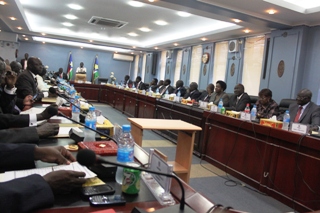S. Sudan cabinet forms emergency committee on oil issue
June 9, 2013 (JUBA) – South Sudan cabinet on Sunday put in place an emergency committee, comprising officials from oil companies and the Petroleum ministry, to monitor the country’s oil situation.

South Sudan president, Salva Kiir chaired the meeting, which lasted nearly five hours.
The Sudanese leader, on Saturday, ordered oil minister Awad al-Jaz to block the pipeline carrying South Sudan’s crude all the way to Red Sea coastal city of Port Sudan.
Bashir, who was speaking in Khartoum state, said this decision was in response to Juba’s continued support to the Sudan Revolutionary Front (SRF) rebels fighting Khartoum on multiple fronts.
The Sudanese president said the decision was taken after thorough study to examine its advantages and drawbacks.
At least 6 million barrels of South Sudan’s crude oil, according to South Sudan information minister, had reached Port Sudan, hours before the Sudanese president ordered for the blockage of oil flow from the south.
“An additional 700,000 barrels [of oil] was flowing through the pipeline to from Paloch in South Sudan to Jebellen in Sudan”, Barnaba Marial Benjamin told reporters shortly after the meeting.
He however said the southern government was yet to receive official notification from its Sudan in relation to the oil matter.
President Kiir and other senior officials, on Saturday, held an informal meeting to devise new mechanisms, after Khartoum announced it would halt oil flow from the south.
Sources told Sudan Tribune that the night meeting, which took place at the president’s residence, was attended by senior government officials, who included the ministers of the presidency, oil, defense, information, cabinet affairs, security, finance, cabinet and foreign affairs.
Sudan and South Sudan, in September of last year, signed a series of cooperation agreements, which covered oil, citizenship rights, security issues, banking, and border trade, among others.
The two countries, in March, also signed an implementation matrix for these cooperation agreements.
The decision to close the oil pipeline comes two weeks after the Sudanese leader issued an ultimatum, demanding that its southern neighbor stops its alleged support to rebel groups.
Juba has repeatedly denied these claims and instead accuses Khartoum of using proxy wars to fight its leadership.
South Sudan took with it nearly 75% of oil it previously shared with neighboring Sudan, when it broke away from the latter in July 2011 as part of the peace accord signed six years earlier.
In January last year, however, the young nation shut down its oil production over a dispute with Khartoum over transit fees. Revenues from oil initially accounted for nearly 98% of South Sudan’s annual budget.
(ST)
